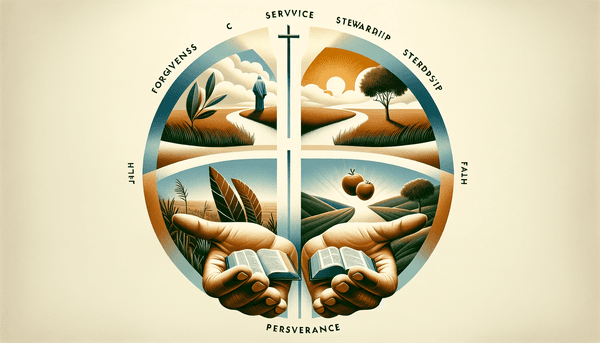The Nature of Forgiveness in Christianity
At the heart of Christian teaching is the principle of forgiveness, a divine attribute that followers of Christ are called to emulate. When Peter approached Jesus with a question about the limits of forgiveness, asking 'Lord, how many times shall I forgive my brother or sister who sins against me? Up to seven times?' Jesus responded with a call to radical mercy: 'I tell you, not seven times, but seventy-seven times' (Matthew 18:21-22). This interaction emphasizes the expectation for Christians to extend forgiveness repeatedly, mirroring the inexhaustible forgiveness God offers us. The act of forgiving is further exemplified in the words of Christ from the cross, 'Father, forgive them, for they do not know what they are doing' (Luke 23:34), demonstrating the profound depth of divine mercy even in the face of suffering.
Christian Service and Stewardship
Service and stewardship are essential expressions of love and commitment in the Christian life. Service, as demonstrated by Jesus, is an act of self-giving love. Jesus taught His disciples that 'even the Son of Man did not come to be served, but to serve, and to give his life as a ransom for many' (Mark 10:45), setting the ultimate example of sacrificial service. Stewardship involves the responsible management of the gifts that God has entrusted to each person. Believers are encouraged to use their unique talents for the benefit of others, as articulated in the admonition to use the diverse gifts received 'to serve others, as faithful stewards of God's grace in its various forms' (1 Peter 4:10). This principle of stewardship extends to all aspects of life, including time, talents, and treasures, and challenges individuals to serve the common good in humility and love.
Endurance and Hope in Christian Life
Christian life is marked by a steadfast hope and endurance as believers navigate the complexities of the world. 'But if we hope for what we do not see, we eagerly wait for it with perseverance' (Romans 8:25) serves as a reminder of the need for patience and persistence in the face of life's uncertainties. The entire chapter of Romans 8 offers assurance to believers, speaking to the life and peace found in the Spirit, the future glory awaiting creation, and the inseparable love of God. It is in this context that Christians are called to maintain their hope and exhibit perseverance, trusting in God's promises even when they remain unseen, and standing firm in the conviction that the challenges of the present are preparing them for an eternal glory that far outweighs them all.
The Story of Susanna: Standing Firm in Faith
The story of Susanna, found in the apocryphal extension to the Book of Daniel, offers a poignant example of unwavering faith in the face of false accusations. Susanna, a woman of devout faith and integrity, is wrongly accused of adultery by two elders whom she rebuffed. Despite the threat of death, she refuses to sin against God by falsely confessing. It is through the wisdom of the young Daniel that the truth is revealed and Susanna is vindicated. Her story is a testament to the power of standing firm in faith, trusting in God's deliverance, and the ultimate triumph of truth. It serves as an encouragement for believers to cling to their faith, even when circumstances seem dire, trusting in God's wisdom and justice to prevail.
Conclusion
The biblical teachings on forgiveness, service, stewardship, faith, and perseverance are not merely abstract concepts but practical guides for living a life that reflects the love and grace of God. Through the stories and instructions found in the scriptures, believers are called to embody these principles in their everyday actions and relationships. By embracing forgiveness as Jesus did, serving others selflessly, responsibly managing God's gifts, nurturing the gift of faith, and waiting patiently for God's promises, Christians can journey towards a deeper spiritual maturity. This journey often involves finding wholeness and understanding our identity in God, as well as the importance of praise and testimony. May this exploration of scriptural wisdom encourage and inspire a more profound engagement with the transformative power of these timeless truths.
FAQ
Q: What does Matthew 18:21-22 teach about forgiveness?
A: Matthew 18:21-22 emphasizes the importance of forgiveness and the limitless nature of God's mercy. It teaches that Christians should be willing to forgive others repeatedly, reflecting the boundless forgiveness that God offers to humanity.
Q: How is faith described in Ephesians 2:8-9?
A: Faith is described as a gift from God, given by grace and not by our own efforts. This teaches us that faith is granted by God's grace, and not as a result of works, so that no one may boast.
Q: Can you tell me more about the story of Susanna in the Bible?
A: The story of Susanna, found in the apocryphal extension to the Book of Daniel, tells of a virtuous woman who was falsely accused of adultery. Through Daniel's wisdom, her innocence was proven, emphasizing the importance of faith and divine justice.
Q: What is the significance of Romans 8:25?
A: Romans 8:25 speaks to the concept of faith and perseverance in the Christian life, encouraging believers to patiently wait for the promises of God, even when they cannot see the fulfillment of their hope.






